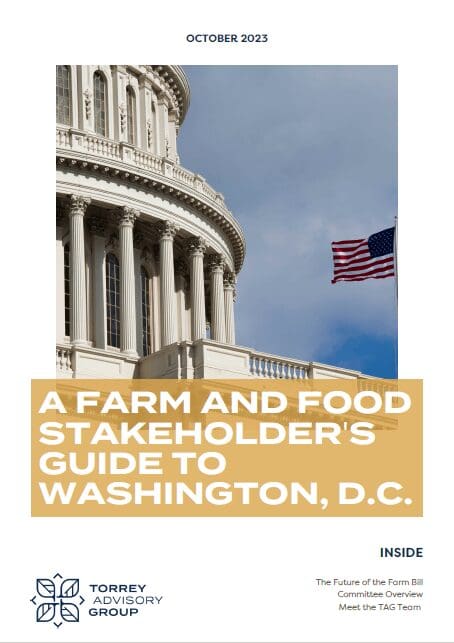The Latest Insights from Team Torrey on the Future of the Farm Bill
October 2023

A message from Katie Naessens, Vice President, Torrey Advisory Group
Congress is coming to an inflection point – to pass a new farm bill or extend the current authorities and suspend permanent law. The 2018 Farm Bill expired on September 30 and now Congress must act to provide certainty to families and farmers impacted by the programs authorized in the farm bill. Not only is the bill a form of a safety net, providing risk management tools to producers and food assistance to struggling families, but it is also an economic driver that delivers new opportunities to rural communities, invests science and technology to spur innovation, and supports voluntary conservation programs to improve production and protect the environment.
A Tale of Two Farm Bills
A regular order farm bill generally takes about 2 – 2.5 years to make its way through the legislative process. A new reauthorization of the bill will originate in House and Senate separately with each committee carefully considering stakeholder feedback and recommendations to improve each title and provision of the bill. The final bill comes together after months of input, writing and conference negotiations. If the House and Senate can pass separate versions of the bill by the end of 2023, it is still possible that Congress could hash out final details and pass a conferenced 2024 Farm Bill early in the new year, while avoiding the need to pass a short-term extension.
However, Congress is quickly approaching the end of the calendar year without clear direction on new farm bill policy. An extension of the 2018 Farm Bill or suspension of permanent law will likely be needed to continue the authorities of existing program so that negotiations can continue well into 2024 without major disruption to farm programs and the supply chain. Since September 30, programs like nutrition assistance and farm commodity programs have expired and by January 1, 2024, some commodity programs will be subject to 1940s permanent law and archaic supply management provisions that could drive up food prices. Other programs, like research grants and organic cost-share certification that receive mandatory funding through the farm bill but are not included in the Congressional Budget Office’s budget baseline, will run out of money until a new bill is authorized with new money.
Political Interception
The House farm bill process has historically been a challenge to navigate, often past political dynamics have forced separate votes on farm programs vs. nutrition. This farm bill cycle has proven no different. Prior to September 30, speculation of how a farm bill could pass through an open amendment process has been questionable. Does the bill have enough votes in the current political environment to pass the House floor without destructive amendments that hurt both farmers and families?
Add in a new political curve ball – who will be the new Speaker in the House? Kevin McCarthy (R-CA), who was recently ousted from the Speakership, as a former agriculture committee member and veteran of the farm bill process, had previously committed his public support for getting a farm bill across the finish line. It remains unclear how a new Speaker will navigate the farm bill floor process. The two top candidates are Reps. Steve Scalise (R-LA), who Republicans recently picked as their nominee, and Jim Jordan (R-OH). Rep. Jordan has never voted in favor of a farm bill and Rep. Scalise only voted in favor of the 2018 Farm Bill, voting against the 2008 and 2014 Farm Bills.
Funding Debate
Not only does the farm bill have a murky path to a floor vote but there are still numerous policy debates and funding challenges that need to be addressed. The farm bill has historically debated the balance between commodity and hunger programs and this farm bill is no different. Debates about commodity reference prices and the Thrifty Food Plan are taking center stage. However, in this farm bill a new debate has emerged around the investments made to USDA programs by the Inflation Reduction Act. Farm bill leaders will need to determine what to do with the remaining $40 billion investment – move it into the farm bill or leave it alone to expire in 2031.
In addition to these big decisions, funding pressures are coming from all facets of the farm bill stakeholder community, including lesser discussed issues like trade promotion and marketing tools; land access and organic transition; agricultural research and research facilities; and nutrition incentive programs. These requests seek new money and put pressure on farm bill leadership to look outside the agricultural committee jurisdiction for additional resources and will require lawmakers to carefully evaluate existing programs.
Outlook for the Future
Since the creation of the first Farm Bill in the 1930s, and despite an often-bumpy road to passage of the farm bill, including delays and extensions, a veto, and single party control of the process, Congress has always managed to find a bipartisan path forward. The historical precedence is encouraging despite political obstacles and funding uncertainty, but don’t expect anything to happen quickly.
About the Author: Katie joined Team Torrey after spending nearly a decade advising Senator Debbie Stabenow (D-MI) on the U.S. Senate Committee on Agriculture, Nutrition, and Forestry. At Senate Ag, Katie advised leadership on issues including agricultural research, specialty crops, credit, beginning and underserved farmers, food safety, and nutrition. Her legislative achievements include passage of the 2018 and 2014 Farm Bills. Prior to the Hill, Katie held a political appointment in the Obama Administration at USDA. Katie was born and raised in Minnesota and received her bachelors degree in economics and political science from the University of Wisconsin-LaCrosse.
Farm & Food Stakeholder’s Guide to Washington, D.C.
The Future of the Farm Bill Edition

In our latest edition of the Farm & Food Stakeholder’s Guide we provide an overview of the farm bill process, from its historical perspective to what lays ahead for the next farm bill, along with a guide to the 118th Agriculture Committees.
Team Torrey Updates
Torrey Advisory Group welcomes Heath Brandt as our newest policy team member in the position of policy coordinator. Heath was a recent TAG intern and spent the the past summer interning for the Senate Committee on Agriculture, Nutrition, and Forestry. A Missouri native, Heath attends the University of Missouri where he is finishing up his degree in agricultural communications.

